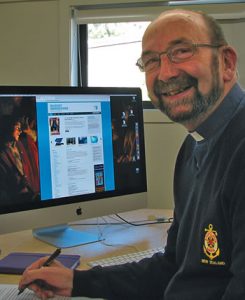Reflecting on Covid-19

By Fr Kevin Head SM
It is mid-May, about 55 days since we first went into lockdown, an experience that has been like being in a state of suspended animation. Last Friday I ventured into the local supermarket for the first time in more than seven weeks. It felt eerie. I was aware that I was acting differently from the way I used to. I steered clear of people, and not only to maintain social distance. It was as though I were afraid of them. I felt truly relieved when I arrived home.
Animals and birds have been acting differently too. “New Zealand birds are loving this lockdown, no longer having to compete with cars, buses, trains, planes or people. Kererū have been landing on back fences, pīwakawaka have been seen playing on Lambton Quay, and tūī have definitely been singing loudly at the crack of dawn”, according to Katie Doyle, Radio NZ, 14 April 2020. The altamira oreole bird (see here, or page 43 of the print edition) has returned to Brownsville, Texas. In many places, wildlife is invading densely populated areas. Wild goats in Llandudno, North Wales, seem to enjoy being in town. Animals at Wellington Zoo were “struggling with lack of human visitors” (One News, 30 March).
In mid-May, two months after the cruise ship industry shut down on account of Covid-19, there were still at least 100,000 cruise ship crew members unable to disembark on the east coast of America alone. “In the avenue of ocean that stretches south from Miami to Cuba and northeast to the Bahamas, dozens of cruise ships sail back and forth. Every so often, they come into Florida ports to refuel and restock. Otherwise, they wait” (Stuff, 18 May). Many of these seafarers were no longer being paid.
In the cargo-shipping industry, travel restrictions in place because of Covid-19 prevent the disembarkation of those working on ships and the boarding of those who were to replace them. The result is that “seafarers are at heightened risk of infection and mental illness; those forced to stay onshore are unable to support their families, while consumers could face import shortages” (Madeline Speed, Al Jazeera, 25 April) -- see the article on Sea Sunday here, or page 13 of the print edition.
Less seriously, for those who are not too worried about French grammar, the French Academy, guardian of the purity of the French language, has declared that “Covid” is feminine rather than masculine. And, on a positive note, the suicide rate in Japan fell 20% in April compared to the same period last year, significant factors being “people spending more time at home with their families, fewer people ... commuting to work and delays to the start of the school year ...” (The Guardian, 14 May 2020).
So far, when compared with many other countries, Aotearoa New Zealand has been relatively lucky in avoiding the ravages of Covid-19. As the Honourable Winston Peters expressed it, “we dodged a bullet”. When we look at our situation, how could we not feel grateful?
We owe prayers of thanksgiving to God that most of our citizens are safe and well. We owe a debt of appreciation to the cheerful, efficient and patient workers in our supermarkets and dairies – many of them earning less than the living wage. We owe a similar obligation of gratitude to the health workers and members of government who have worked long and hard to protect our country. And practical gratitude suggests a measure of generosity in helping those whom we are able to help, insofar as we have the means to do so.
Donating to the Caritas Aotearoa New Zealand Covid-19 Pandemic Appeal assists those suffering in Papua New Guinea, Solomon Islands, Kiribati, Vanuatu, Tonga, Samoa, Fiji, Timor Leste, Cambodia, the Holy Land and Colombia.
In New Zealand, think about visiting
https://caritas.org.nz/covid-19-pandemic-appeal
In Australia, go to
https://www.caritas.org.au/learn/emergency-response
And thank God if you are safe and well.
 Entries(RSS)
Entries(RSS)